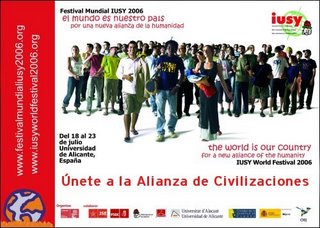Finally... after a few vacuous posts, I'm writing about Young Labour's
amazing trip to Spain a couple of weeks ago. Unfortunately I lost many of my photos, but there's a few in the next post...
 IUSY Festival 2006
IUSY Festival 2006 Alicante Spain
The IUSY festival was a wonderful experience for me. To be surrounded by 4,000 other young people, all united in Alicante for the same cause, was very inspiring. There are no words to describe the sense of belonging and tenacity that I felt with my comrades whilst in Spain.
The first day was good for the New Zealand delegation. Despite being a group of only eleven people we received loud cheers at the opening ceremony, and threw out Labour wristbands, which proved to be a hit among other delegates. Occasionally we would get mistaken for Australians because of our similar accents and flags, but once that was cleared up we were extremely popular.
Socialising with such a wide range of different nationalities was a very new and interesting experience for several of us. I made good friends with some comrades from the German delegation and had a fascinating discussion with them about patriotism and Spanish and German history. We hung out with Palestinian, Israeli, Spanish, and UK delegations too, and despite some language barriers we all got along famously well. (Phrasebooks were made fun of) Talking with other delegates was as educational as the formal workshops at times.
On the subject of workshops, the ones I found most outstanding were focussed on Feminism and Global Governance.
I attended two workshops on Feminism, concerning women in work and in politics. In both workshops I was asked to share insight on what it is like to be a female New Zealander. I was extremely proud to admit that I come from the first country to grant women the right to vote, and I shed light on our relatively equal representation in parliament and leadership positions. I also admitted, however, that females on average here earn 82 cents for every dollar that males earn in the workforce. I talked about the fact that females take twice as much time to pay back their student loans after graduating, but how we are combating this with our interest free student loan policy.
At the women in politics workshop we discussed ways in which gender equality can be achieved in government and the private sector. Solutions that were identified included:
- Quotas for women
- Encouraging working laws with flexible maternity and paternity leave
- Acknowledging different personality traits in men and women; that men tend to be very loyal in their support of other men – this is perhaps something women need to work on in their relationships with one another. (A contentious issue, but a possibility nonetheless)
These workshops were meaningful to me; as women we empathised with each other, shared ideas and common beliefs – with a different but equally valid perspective expressed from different parts of the globe. A young socialist from Sweden told us an analogy – “If an alien was to land in front of me I would not introduce myself as a woman, but first and foremost, a human being. That is simply how we should all see each other.”
Another couple of good workshops were on the topic of European Union migration and development policy, where I learnt useful information that could relate to New Zealand’s 0.7 campaign. EU development policy certainly does have its positives: EU member States provide 55% of the world’s Development aid and they have recently promised to reach 0,56% of their GDP by 2010 and 0,7% by 2015. Half of their aid has been specifically allocated to Africa in the future.
However, the workshop pointed out several issues wrong with EU aid, such as misleading figures of EU member states in their official Aid budgets. In 2005, EU Member States have spent almost one third of total EU Development aid (13,5 billion €) on:
- Debt cancellation (despite the illegitimacy of most of it)
- Housing refugees within the EU (refugees trying to escape political persecution or misery)
- Educating foreign students within European countries.
Guillaume Fine, the French presenter, also talked about the inconsistencies of development policy: Actual assessment and self-criticism of policies are apparently not very frequent and, whenever they exist, rarely question the overall approach. Criticism often raises administrative, financial or technical issues but rarely points out the political causes of the failures.
Due to internal pressure from EU Member States to “spend the European Development Fund money fast”, “quick disbursement” programmes have emerged, such as budgetary aid given directly to the treasury of the recipient country. Such processes lead to allocating budgetary aid regardless of the political situation, the nature of political regimes or the level of transparency in national spending. The EU is apparently also not keen on financing, supporting and observing national electoral processes.
Guillaume also pointed out problems with migration policy: A large number of countries from which migrants are fleeing are governed by illegitimate or dictatorial regimes that loot the natural resources (raw materials, forestry, crude oil), at the expense of their population. Eg. Cameroon, Gabon, Congo Brazzaville, Togo, Chad and Mauritania (until August 2005). Yet these immoral regimes continue to be supported by some EU member States, which want to maintain a “stable context” in their former colonies for commercial, geo-strategic or military interests.
While EU officials or Member States advocate the implementation of sound socio-economic policies in the countries of origin in order to prevent massive migratory flows, needless to say that the harmful effects of the globalised economic system have to be tackled first, and that neo-colonialism must be stopped.
I also attended a great workshop held by Tony Milne on New Zealand’s civil union campaign. He talked about how the campaign was conducted here - particularly on how many heterosexual individuals got involved and what this did to make it a more ‘mainstream’ issue. He also highlighted the opposition (Destiny Church, etc) to our campaign and the negative public reaction to that. It was empowering to be part of a delegation that can share some wisdom on campaigning for equal rights for homosexual couples.
During the conference New Zealand (for the first time) was asked by other delegations to attend networking meetings with them. The one that stood out most for me was our meeting with the Philippines, or Akbayan Citizen’s Action Party.
It was extremely eye opening to meet such a dedicated group of individuals, who have encountered such a large amount of corruption and many more challenges than the Labour party has ever come across here. For example, most of the group we met slept in their party offices, due to a lack of party funds. Gloria Macapagal-Arroyo’s party have unjustly won their elections by allegedly buying votes from families who don’t refuse the offer because they cannot afford to feed themselves. The government in the Philippines is dominated by wealthy families and is too influenced by big business donations. We were told of government spies at the university there, who keep an eye on ‘political’ individuals. We were told of assassinations of people in their party, simply for being socialists.
The Philippines is therefore a country that we all expressed an interest in helping through future projects, along with a larger focus on helping our Pacific neighbours.
Overall I found the IUSY conference an extremely worthwhile experience, and would recommend it to anyone who has an interest in politics and helping people. One day I would love to return to another IUSY festival and meet again with the friends I have made. I look forward to applying what I have learnt to New Zealand and the wider international community, whatever way that might be.
Kate, Jordan, Conor, Harriet, Tony, Jonathon, Sophie, Alaistair, Jocinda, Caleb - love you all, you guys rock ;)


